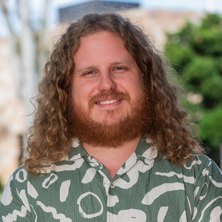
Overview
Background
Coen is an interdisciplinary biologist researching and teaching in anticolonial scientific praxis. Coen has scientific expertise in ecological and evolutionary biology, molecular biology and animal physiology and has published academic works across disciplines. Coen has broad interests in centering Indigenous priorities and Indigenous rights in scientific research, emphasising respectful engagement with Indigenous communities. Coen's work bridges cultural and scientific gaps, fostering a deeper understanding of Indigenous ways of coming into knowledge as a valid scientific endeavour.
Coen is a trawlwoolway pakana related to northeast lutruwita (Hearps, Briggs family) and accountable to the Tasmanian Aboriginal community. Coen grew up as a visitor to many lands in so-called Australia and currently is associated with Yuggera and Turrbal lands around Magandjin.
Availability
- Dr Coen Hird is:
- Available for supervision
- Media expert
Fields of research
Qualifications
- Bachelor of Science, The University of Queensland
- Bachelor (Honours) of Science (Advanced), The University of Queensland
- Doctor of Philosophy of Animal Physiological Ecology, The University of Queensland
Research interests
-
Native bee ecology in a changing climate
Are native stingless bees in decline throughout Australia? How do changes in climate and weather affect native bee activity and physiology? How do we engage animal ethics for research on culturally significant species?
-
Global Indigenous custodianship of migratory kin
How can relational and kin-based conservation approaches be integrated into conservation of migratory species? What pathways can Indigenous communities use to influence policy on migratory species conservation without relying on nation-state frameworks?
-
Bioacoustic monitoring of endandered amphibians
What are the potential challenges and benefits of using automated acoustic detection methods in long-term amphibian conservation projects? How can integrating Indigenous ecological knowledge enhance the effectiveness of bioacoustic monitoring for endangered species on Aboriginal lands?
Works
Search Professor Coen Hird’s works on UQ eSpace
2023
Other Outputs
Cold-acclimation completely compensates UV radiation-induced DNA damage rate in amphibian larvae (Limnodynastes peronii)
Hird, Coen, Cramp, Rebecca and Franklin, Craig (2023). Cold-acclimation completely compensates UV radiation-induced DNA damage rate in amphibian larvae (Limnodynastes peronii). The University of Queensland. (Dataset) doi: 10.48610/221fbfe
2023
Other Outputs
Cold-induced skin darkening does not protect amphibian larvae from UV-induced DNA damage
Hird, Coen, Franklin, Craig and Cramp, Rebecca (2023). Cold-induced skin darkening does not protect amphibian larvae from UV-induced DNA damage. The University of Queensland. (Dataset) doi: 10.48610/f559345
2023
Other Outputs
The ultraviolet microenvironment in freshwater ecosystems: implications for amphibians.
Hird, Coen, Franklin, Craig and Cramp, Rebecca (2023). The ultraviolet microenvironment in freshwater ecosystems: implications for amphibians.. The University of Queensland. (Dataset) doi: 10.48610/0f81bde
2022
Journal Article
Temperature causes species-specific responses to UV-induced DNA damage in amphibian larvae
Hird, Coen, Franklin, Craig and Cramp, Rebecca (2022). Temperature causes species-specific responses to UV-induced DNA damage in amphibian larvae. Biology Letters, 18 (10) 20220358, 1-6. doi: 10.1098/rsbl.2022.0358
2022
Journal Article
Down a rabbit hole: burrowing behaviour and larger home ranges are related to larger brains in leporids
Todorov, Orlin S., Hird, Coen, Kraatz, Brian, Sherratt, Emma, Hill, Narelle, de Sousa, Alexandra A., Blomberg, Simone and Weisbecker, Vera (2022). Down a rabbit hole: burrowing behaviour and larger home ranges are related to larger brains in leporids. Journal of Mammalian Evolution, 29 (4), 1-11. doi: 10.1007/s10914-022-09624-6
2022
Other Outputs
Temperature causes species-specific responses to UV-induced DNA damage in amphibian larvae
Hird, Coen, Cramp, Rebecca and Franklin, Craig (2022). Temperature causes species-specific responses to UV-induced DNA damage in amphibian larvae. The University of Queensland. (Dataset) doi: 10.48610/4fdfc26
2022
Book Chapter
Blinding whiteness
Hird, Coen (2022). Blinding whiteness. Griffith Review 77: Real Cool World. (pp. 225-235) Melbourne, VIC Australia: Text Publishing Company.
2022
Journal Article
The role of environmental calcium in the extreme acid tolerance of northern banjo frog (Limnodynastes terraereginae) larvae
Hird, Coen, Franklin, Craig E. and Cramp, Rebecca L. (2022). The role of environmental calcium in the extreme acid tolerance of northern banjo frog (Limnodynastes terraereginae) larvae. Journal of Experimental Biology, 225 (13) jeb244376. doi: 10.1242/jeb.244376
2021
Other Outputs
The role of calcium transport in the extreme acid tolerance of northern banjo frog larvae (Limnodynastes terraereginae)
Hird, Coen, Cramp, Rebecca and Franklin, Craig (2021). The role of calcium transport in the extreme acid tolerance of northern banjo frog larvae (Limnodynastes terraereginae). The University of Queensland. (Dataset) doi: 10.14264/18c7301
2021
Other Outputs
Aquatic UV and temperature low power field data logger (version 1)
Hird, Coen, Cramp, Rebecca and Franklin, Craig (2021). Aquatic UV and temperature low power field data logger (version 1). The University of Queensland. (Dataset) doi: 10.14264/5ed5d99
Funding
Current funding
Supervision
Availability
- Dr Coen Hird is:
- Available for supervision
Looking for a supervisor? Read our advice on how to choose a supervisor.
Available projects
-
Behavioural Ecology of Stingless Bees
We are seeking a highly motivated PhD candidate to join an ARC-funded project investigating the foraging ecology, behaviour, and environmental physiology of Australian stingless bees.
The project explores how native stingless bees respond to changing environmental conditions. The research will be based at The University of Queensland (St Lucia campus).
This is an exciting opportunity to contribute to native pollinator research and biodiversity conservation, working at the intersection of behavioural ecology, climate science, and entomology.
Ideal candidates will have:
-
A background in biology, ecology, or related fields
-
Experience (or strong interest) in insect behaviour, fieldwork, or pollination biology
-
Strong communication and quantitative analytical skills
Fully funded stipend available (subject to eligibility). Indigenous applicants are especially encouraged to apply.
Flexible start date, from early 2026 on. To express interest, please email a brief CV and statement of interest.
-
Media
Enquiries
Contact Dr Coen Hird directly for media enquiries about:
- Ecophysiology
- Indigenous science
Need help?
For help with finding experts, story ideas and media enquiries, contact our Media team:
